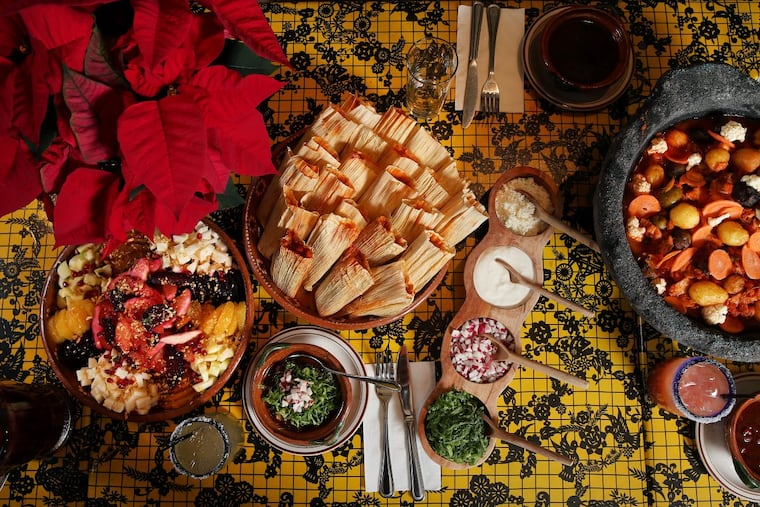Feliz Navidad from El Rey with tamales, pork pozole and fruit
In El Rey chef Dionicio Jimenez's native Mexico, the big holiday meal is Dec. 24. Christmas is a quieter, low-key day for sleeping in, gifts, and, sometimes, nursing hangovers.

On Christmas Eve, the Mexican city of Puebla is aglow with lighted windows, the air filled with the sounds of music and families, friends, and neighbors celebrating one of the biggest nights of the year. El Rey chef Dionicio Jimenez was one of many children whose families always enjoyed a holiday feast on Dec. 24, sometimes after midnight Mass. Christmas was a quieter, low-key day for sleeping in, gifts, and, sometimes, nursing hangovers.
That's where the pork pozole comes in, Jimenez said. The thick, hearty soup is served along with the other dishes at Christmas Eve dinner — but there's always plenty left over for the next day. Its comforting spiciness, topped with bright herbs, the crunch of radish, and maybe a sprinkling of cheese, would perk up even the groggiest holiday guest.
"Christmas Eve is the party. Christmas is more of a recovery day," Jimenez said in El Rey's Center City dining room, which was decorated with potted poinsettias and shiny piñatas hanging from the ceiling. "You stay in bed, you open presents, you just enjoy the time with your family."
Along with the pozole, Jimenez's childhood Christmas Eve — or Nochebuena — dinners included platters of tamales; a heaping dish of fish-based bacalao with peppers and olives in a tomato-based sauce; a salad with beets, oranges, jicama, and pomegranate; pitchers of bright, fruity punch; an apple dessert salad; and much, much more. The family always started preparing the feast days ahead of time, making enough to feed an army.
"You don't know how many people are coming," said Jimenez, who now lives in South Philadelphia with his family. "The American way is, you send invitations, you say yes or no. For us, you have a party and it could be 50, it could be 100 people. The guests bring guests, those guests bring guests. You never set the table for any number of people. We don't like to set a limit."
Though Jiminez has lived in the United States since 1998, the holiday traditions — and recipes — from Mexico have endured. He usually makes those family favorites for Christmas Eve dinner, starting with a large batch of rich, porky pozole, infused with chilies for an addictive, savory flavor. It can be garnished with anything from slivers of piping-hot jalapeños to slices of creamy avocado.
The bacalao calls for dried codfish, tomatoes, hot peppers, herbs, capers, and olives cooked into a rich, flavorful stew to be eaten over rice and served as a main dish. "You can change the kind of fish, but there's always seafood on the table," he said.
Tamales are another major Christmastime staple; Jimenez makes his with chicken, onions, peppers, spices, and red salsa, stuffing the filling into a masa harina dough made from corn, chicken broth, lard and salt, then steaming them in corn husks.
A colorful Nochebuena salad made with beets, apples, jicama, pomegranate, and crushed peanuts was always on the table for family meals, Jimenez said. The cool beets and fruit make for a soothing contrast to the spice of the other dishes.
"In Mexico, you use what's in your backyard," he said. "You use what you have to make your dinner. That's why you see a lot of apples when they're in season."
Pitchers of Christmas punch, Ponche Navideño, are set out for children and adults. Jimenez's blend includes apples, tamarind, guava, oranges, hibiscus, and sugar cane. The drink, served hot, can be sipped on its own or spiked with tequila or rum.
Baskets of flour tortillas fried in sugar and cinnamon are often set out for dessert, alongside a cold apple salad with walnuts and a touch of lime juice, sweetened with condensed milk and peaches. The salad is mildly sweet and lends a crunchy, refreshing finish to a rich meal.
This year, Jimenez plans to celebrate Christmas Eve with his family and most likely his extended family, as well.
"You invite your closest family, you invite your cousins," he said. "It's going to be 30, 40 people. So you pick who's got the bigger house." But to them, he said, hosting doesn't mean taking on any more work.
"Everyone brings food, everyone is cooking, everyone cleans up," he said. "Everyone knows we leave the house the way we found it, so we all have a good time."